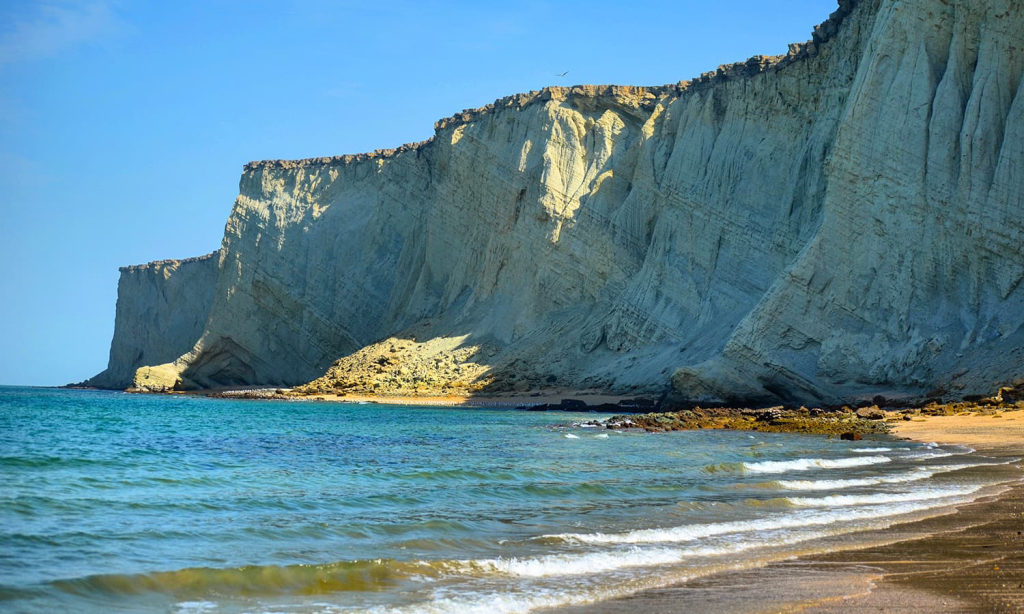Astola Beach: Your Complete Guide to Pakistan’s Remote Marine Paradise


When people think of Pakistan’s natural beauty, they usually picture the snow-capped mountains of the north. Yet far to the south, in the Arabian Sea, lies a hidden wonder that few outside the region know about — Astola Beach. Also known as Jezira Haft Talar or the Island of the Seven Hills, it is Pakistan’s largest offshore island and a rare marine protected area. For travelers seeking adventure, solitude, and ecological richness, Astola is unmatched.
This guide will give you everything you need to know about Astola Beach — from how to get there and when to visit, to what activities you can enjoy and how to respect its fragile environment. It’s designed for first-time visitors, curious explorers, and anyone interested in experiencing one of Pakistan’s most unique destinations responsibly.
Table of Contents
What Makes Astola Beach Unique
Pakistan’s Largest Offshore Island
Covering roughly 6.7 square kilometers, Astola is Pakistan’s largest offshore island. Rising 246 feet above sea level at its highest point, its dramatic flat-topped plateau and rugged cliffs make it a striking sight in the Arabian Sea. The island lies about 25 kilometers south of Pasni, a coastal fishing town in Balochistan, and is accessible only by boat.
First Marine Protected Area Status
In 2017, Astola Beach was officially declared Pakistan’s first Marine Protected Area (MPA). This means the island and surrounding waters are safeguarded against destructive activities like unsustainable fishing or coral damage. For visitors, it underscores the importance of low-impact travel — leave no trace, avoid disturbing wildlife, and follow all conservation guidelines.
Global Recognition and Biodiversity Importance
Astola Beach has gained international attention for its rare biodiversity. It is recognized as a Ramsar Wetland of International Importance, home to endangered green and hawksbill turtles, unique reptiles like the Astola viper, and more than 60 bird species. Its coral reefs are among the healthiest in the Arabian Sea, making the island a critical site for conservation research and eco-tourism.
How to Reach Astola Beach
Traveling to Pasni: Your Gateway Port


Reaching Astola Beach begins with a journey to Pasni, a small port town in Gwadar District, Balochistan. From Karachi, the trip by road along the scenic Makran Coastal Highway takes around 7 to 8 hours (about 450 kilometers). Travelers can also approach from Gwadar, which is closer at around 2 hours by road. Pasni is where boats are arranged for the onward sea crossing.
Quick Checklist for Reaching Astola Beach via Pasni:
- Drive from Karachi to Pasni via Makran Coastal Highway (7–8 hours)
- Alternative route: Gwadar to Pasni (2 hours by road)
- Arrange a fishing boat or charter in Pasni port
- Expect a 3-hour boat ride to reach the island
Boat Ride Details and Operator Tips
The boat ride from Pasni to Astola Beach usually takes around three hours, depending on sea conditions. Most visitors travel in modified fishing boats, which can accommodate small groups. When selecting an operator, prioritize safety equipment such as life jackets, radios, and experienced crew members familiar with the route. Some operators also provide shaded canopies, drinking water, and snorkeling gear for a more comfortable trip.
Since schedules depend on weather and tides, it’s best to book your trip in advance through local tour organizers or conservation-focused operators. Always check sea forecasts and avoid traveling during rough conditions.
Permits, Rules, and Protected Area Guidelines
Because Astola Beach is part of a designated Marine Protected Area, visitors must follow specific guidelines. In most cases, you won’t need a formal permit for casual visits, but organized tours and research activities require permissions from provincial authorities. Regardless, all travelers should respect the MPA rules:
- No littering — carry back all trash, including plastics and food waste
- No coral collection or disturbance of marine life
- No hunting of turtles, birds, or reptiles
- Respect local fishing activities and avoid blocking boat routes
Alternative Routes via Gwadar and Ormara
While Pasni is the main gateway, travelers can also approach Astola Beach from Gwadar or Ormara. These routes often involve private charters or special arrangements with fishing communities. They may be more expensive but can be convenient for those already exploring the Makran coast. Regardless of the route, ensure you travel with reliable contacts and prioritize safety.
Best Time to Visit Astola Beach


Weather and Sea Conditions
The climate around Astola Beach is hot and arid, with temperatures often exceeding 30°C (86°F) in summer. The best months for smooth seas and clear skies are October through March. Calm waters make the boat ride safer and snorkeling visibility better during this period.
Wildlife and Turtle Nesting Seasons
If you want to witness nesting green turtles, plan your trip between May and August. This is when female turtles come ashore to lay eggs on Astola’s sandy beaches. Birdwatchers, on the other hand, may prefer winter months, when migratory species pass through the Arabian Sea flyway.
Fishing Seasons and Local Activity
Pasni’s fishing community is busiest during summer, with boats heading out for tuna, mackerel, and lobster. Visitors may find it easier to charter boats in winter or spring, when seas are calmer and fishermen are more available to take tourists.
When to Avoid the Monsoon
June to August is the peak monsoon season in the Arabian Sea, bringing high winds and unpredictable swells. Boat travel during this period can be dangerous, and many operators refuse trips. To avoid cancellations or risky voyages, steer clear of these months when planning your journey.
Things to Do at Astola Beach
Snorkeling and Diving Around Coral Reefs
The waters around Astola Beach host over 20 species of hard corals and hundreds of colorful reef fish. Snorkeling here offers a rare look at marine ecosystems still thriving in the Arabian Sea. For divers, visibility is best during winter, though facilities are limited, so bringing your own gear is advised. Always use reef-safe sunscreen to protect delicate corals.
Beach Camping and Stargazing
One of the most unforgettable experiences at Astola Beach is camping overnight on its untouched shores. With no light pollution, the night sky reveals an incredible view of the Milky Way and countless stars. Campers should bring their own tents, fresh water, food, and cooking supplies since no facilities exist on the island. Fires should be kept minimal to protect nesting turtles and local habitats.
Hiking the Seven Hills
Astola is often called “Jezira Haft Talar” or the Island of Seven Hills because of its distinctive ridges. Adventurous visitors can hike these rocky outcrops for panoramic views of the Arabian Sea. The terrain is uneven, so proper footwear is essential. Avoid climbing during peak heat hours, and always carry sufficient water.
Photography, Drone Rules, and Ethical Practices
Astola’s landscapes — from turquoise waters to dramatic cliffs — are a paradise for photographers. Drone use is possible but must be done carefully, especially during turtle nesting season when noise can disturb wildlife. Always seek local advice before flying drones and follow Pakistan’s civil aviation regulations. Ethical photography also means respecting the privacy of fishermen and their families in Pasni.
Astola Beach Marine Life and Conservation
Sea Turtles and Nesting Habits
Astola Beach is one of the few places in Pakistan where endangered green turtles and hawksbill turtles nest. Visitors may see turtle tracks, nests, or even hatchlings making their way to the ocean. Touching or interfering with turtles is strictly prohibited. Observing from a safe distance helps protect this fragile life cycle.
Coral Reefs and Fish Species
The island’s reefs are home to at least 23 documented species of hard corals and hundreds of fish species, including parrotfish, angelfish, and groupers. Healthy coral systems make Astola a critical site for marine research. Divers and snorkelers should avoid stepping on corals and use non-toxic, reef-safe products to minimize damage.
Bird Watching and Endemic Species
Over 60 bird species have been recorded around Astola Beach, including migratory waterfowl and seabirds. The island also supports unique reptiles like the Astola saw-scaled viper, found nowhere else in the world. For eco-tourists, this combination of endemic and migratory wildlife makes Astola an extraordinary biodiversity hotspot.
Challenges and Ongoing Conservation Efforts
Despite its protected status, Astola Beach faces challenges from plastic pollution, illegal fishing, and unregulated tourism. Organizations such as WWF-Pakistan and IUCN work with local communities to monitor biodiversity and enforce marine protection laws. Visitors can support conservation by practicing responsible tourism and sharing awareness of the island’s importance.
FAQ About Astola Beach
What is Astola Beach known for?
Astola Beach is famous for being Pakistan’s largest offshore island, home to rare corals, nesting turtles, and dramatic seven-hill landscapes.
How do you reach Astola Beach from Karachi?
Travel by road from Karachi to Pasni via the Makran Coastal Highway (7–8 hours), then take a 3-hour boat ride to Astola.
When is the best time to visit Astola Beach?
October to March is ideal, with calmer seas and cooler weather. Avoid June to August due to the monsoon season.
What wildlife can you see at Astola Beach?
Endangered sea turtles, coral reef fish, migratory birds, and the endemic Astola viper are among the highlights.
Can you use drones at Astola Beach?
Drones can be used cautiously, but avoid turtle nesting seasons and follow aviation regulations to prevent disturbance.
How much does a trip to Astola Beach cost?
Costs vary but expect around $100–$150 per person, including road transport, boat hire, and basic supplies for camping.
Planning Your Trip to Astola Beach
Packing Checklist and Camping Gear
Since Astola Beach is uninhabited, visitors must bring all essentials. A well-prepared checklist makes the difference between an enjoyable trip and a stressful one:
- Plenty of drinking water (minimum 4–5 liters per person per day)
- Non-perishable food and cooking supplies
- Sturdy tent, sleeping bags, and ground mats
- First aid kit and seasickness medicine
- Power bank or solar charger for electronics
- Flashlights or headlamps with spare batteries
- Reef-safe sunscreen and eco-friendly toiletries
Safety Precautions and Emergency Contacts
There are no permanent facilities or rescue services on Astola, so safety preparation is vital. Travel with experienced operators who carry radios or satellite phones. Always inform the Coast Guard office in Pasni about your trip. Weather can change quickly, so confirm conditions before departure.
Budgeting and Estimated Costs
A typical trip to Astola Beach for a small group may cost around $100–$150 per person. This usually includes transportation to Pasni, boat hire, and shared supplies. Larger, organized tours may charge more but often provide added safety and equipment. Independent campers should budget extra for food, fuel, and contingency items.
Where to Stay in Pasni, Gwadar, or Nearby Towns
Since Astola itself has no accommodation, travelers often stay in Pasni before or after their trip. Options are limited to guesthouses and small hotels. For more comfort, consider Gwadar, where hotels and resorts are available. Ormara is another option for those traveling along the Makran Coastal Highway.
Conclusion: Why Astola Beach Should Be on Your List
Astola Beach is more than just a remote island — it’s a living showcase of Pakistan’s coastal beauty, biodiversity, and cultural history. Whether you come for snorkeling among vibrant reefs, camping under star-filled skies, or exploring ancient ruins, the island rewards visitors with unforgettable experiences.
But with its status as Pakistan’s first Marine Protected Area, Astola also demands responsibility. Visitors should travel light on the land and heavy on respect — protecting the turtles, corals, and fishing traditions that make this destination unique.
Read More About: Top 10 Beaches in Pakistan


Author: ZunNurain Khalid — Travel & Tourism Specialist, Founder of ExploreX Pvt. Ltd., and advocate for sustainable tourism in Pakistan. With over a decade of experience in digital marketing and destination branding, ZunNurain has worked extensively on promoting Pakistan’s natural and cultural heritage.

